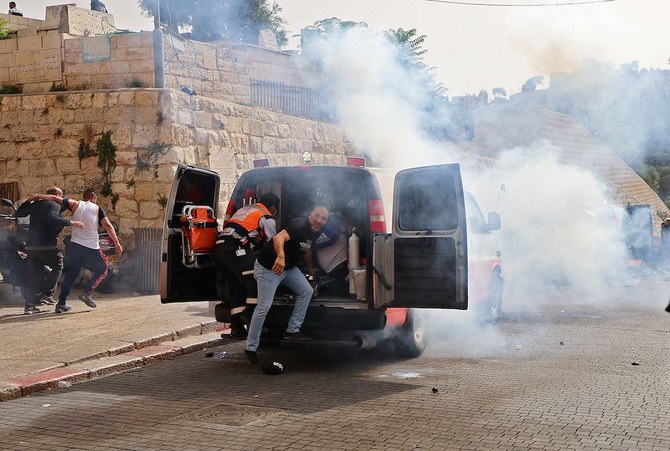AMMAN: Despite calls from the international community for an end to the hostilities between Israeli security forces and Palestinians, clashes continued in Jerusalem on Monday, with violence erupting at Al-Aqsa Mosque, Islam’s third holiest site, for the second day in a row.
Over 300 people have reportedly been injured, with the Red Crescent saying half a dozen Palestinians are in a critical condition.
On Friday, May 7, US State Department spokesman Ned Price called on both sides to show restraint, saying Washington was “extremely concerned about ongoing confrontations in Jerusalem, including on the Haram al-Sharif/Temple Mount and in Sheikh Jarrah,” condemning an attack on Israeli soldiers and “reciprocal attacks on Palestinians.”
US-based outlet Axios, meanwhile, said the White House had pressed Israel to restrain Monday’s planned Jerusalem Day celebrations, marking the capture of East Jerusalem in 1967, so as not to stoke further tension in the city, but that Israel had rebuffed these advances.
Former Palestinian Liberation Organization (PLO) executive committee member Hanan Ashrawi challenged the US and European leaders to “grow a backbone” and “translate their words into action,” over restraining Israel against Palestinian worshippers.
She said: “Americans must learn to grow a backbone and work hard to enforce their position and to use their financial and political power. This is not a big deal to ask to ensure freedom of religion.
“This is the language that the Israelis understand; if they are being rewarded, nothing will happen,” she continued. “There has to be a cost and this is a test of the Biden administration. Americans must say enough is enough.”
Ashrawi added that what is happening is a “crime” and a clear case of multiple human rights violations, including targeting civilians, vandalizing holy sites, and using excessive power against worshipers.
Protests at the Sheikh Jarrah neighborhood, meanwhile, drew the presence of right-wing Israeli members of the Knesset and a large number of Palestinians and their supporters.
The UN secretary-general and senior world leaders were among those to condemn the violence, and express their concerns over the evictions in Sheikh Jarrah.
Jordan summoned the Israeli chargé d’affaires in Amman, and threatened to recall its ambassador in Tel Aviv. There were also loud demonstrations outside the Embassy of Israel in Jordan calling for its closure.
Former Palestinian Authority Prime Minister Salam Fayyad told Arab News that Jerusalem is the symbol of the Palestinian cause.
“The reunification of the homeland and its national institutions requires the full (cooperation) of all Palestinians regardless of where they are,” said Fayad.
“Such reaction is the strongest response to the Israeli aggression and the terror of its army and settlers against our holy places and our people in Jerusalem,” he added.
Fayyad continued that the basic right of people to live in their homes and homeland was fundamental “to allow our people to extract their right to self-determination.”
Hazem Kawasmi, a Jerusalem civil society activist, told Arab News that what is happening in Sheikh Jarrah was the continuation of the last 70 years of evictions of Palestinians from their homes and land across the country.
“Trying to evict 28 families from their houses in Sheikh Jarrah is a clear case that (shows) the Israeli apartheid regime and transfer policy to implement their ‘Judaizing’ of the city, emptying it of its indigenous Palestinian population,” Kawasmi said.
“Not surprisingly, the international community are watching and doing nothing to stop the rogue state of Israel from practicing its ethnic cleansing policies.”
There are fears that Israel’s actions in Jerusalem could also provoke wider problems beyond the city. Senior Hamas figure Salah Aruri warned that “by playing with fire in Jerusalem, the occupiers (Israel) will witness a burning response on their heads.”


























